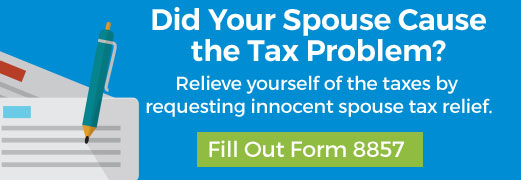IRS Innocent Spouse Tax Relief
When you file a joint return with your spouse, both of you are fully responsible for the taxes. For example, if $20,000 is owed for a joint tax return, you and your spouse owe the IRS $20,000.
If you are now separated and your ex-spouse caused the tax problem, you may qualify for IRS Innocent Spouse Relief.
Three Types of IRS Innocent Spouse Tax Relief
There are three different types of IRS Innocent Spouse Tax Relief.
1) Innocent Spouse Relief – Your spouse failed to report income or took too many write-offs. As a result, the IRS charged additional taxes. You may qualify for Innocent Spouse Relief if you had no idea your spouse did not prepare the tax return correctly.
2) Separation of Liability Relief – Your spouse failed to report income or took too many write-offs. As a result, the IRS charged additional taxes. You did know your spouse made some errors on the tax return. You may qualify for Separation of Liability Relief if you are widowed, legally separated, or not living together for at least one year.
3) Equitable Relief – If you do not qualify for Innocent Spouse Relief or Separation of Liability Relief, you may still qualify for Equitable Relief under certain circumstances.
Innocent Spouse Relief – Type 1 Explained
You qualify for Innocent Spouse Relief if your spouse made an error on the tax return and you did not know it. It would be unfair to make you responsible for the taxes.
The IRS will review the two aspects of the innocent spouse relief: 'you did not know it' and 'it would be unfair.'
Aspect 1 – The IRS will determine if you actually knew of the errors or you should have known.
Aspect 2 – The IRS will review the following:
– Did you benefit from the mistake made by your spouse?
– Did your spouse leave you?
– Did you separate from your spouse?
– Will you suffer financially?
– Did your spouse abuse you?
Separation of Liability – Type 2 Explained
You may qualify for Separation of Liability relief if your spouse made an error on the tax return, you did know it, and you are separated with your spouse. The following are considered separated from your spouse:
– Divorce
– Widowed
– Legally separated
– Lived apart for longer than one year
For this type of tax relief, the IRS will separate the taxes. You will be responsible for only your portion. If you paid your taxes or did not work, then you may be able to remove all taxes.
Equitable Relief – Type 3 Explained
You do not qualify for Innocent Spouse Relief or Separation of Liability, but it would be unfair for you to owe the taxes, you may qualify for Equitable Relief. To show 'unfairness' the IRS will review the following:
– Are you separated or is your spouse temporarily gone due to illness, imprisonment, military, or business?
– Would you suffer financially?
– As part of the divorce, did your spouse agree to pay all the taxes?
– Did you benefit from not paying the taxes?
– Did you pay your own taxes?
– Did you know about the mistakes?
– Did your spouse abuse you?
– Were you in poor mental or physical health when the tax return was signed?
If you qualify for one of three IRS Innocent Spouse Tax Relief types, the IRS will remove a portion of the taxes or all taxes.
IRS Innocent Spouse Tax Relief is different than IRS Injured Spouse Tax Relief, which is requested when your spouse owes the taxes but you do not.

